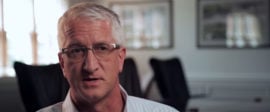Best of Daily Reflections: The Crack in Human Character
Daily Reflection / Produced by The High Calling
Again, you have heard that it was said to those of ancient times, “You shall not swear falsely, but carry out the vows you have made to the Lord.” But I say to you, Do not swear at all, either by heaven, for it is the throne of God, or by the earth, for it is his footstool, or by Jerusalem, for it is the city of the great King. And do not swear by your head, for you cannot make one hair white or black. Let your word be “Yes, Yes” or “No, No”; anything more than this comes from the evil one.
Matthew 5:33
When Jesus forbids swearing falsely, he isn’t referring to cursing, but to making deceptive promises. Human beings are experts in the fine art of deception.
David Brooks writes about Dan Ariely’s book The (Honest) Truth about Dishonesty. Ariely discovered in his research that most people cheat—but just a little. For example, they gave thousands of people twenty number problems to solve. When they handed in their answer sheet, people got an average of four correct responses. But when they shredded the answer sheet and self-reported their score, they claimed six correct answers. They cheated but just a little. Another time Ariely put plates with dollar bills next to cans of Coke in a college dorm kitchen. People took the Cokes not the dollar bills. That would have felt more like stealing.
This little crack in human character is what makes all of us suspicious and suspect. When we’re young and say we’ll do something, we are asked, “Do you promise?” When we get older and enter an agreement, we have it notarized with certified ID and reliable witnesses. We live in a world of deceptions.
Our culture is a written culture. We sign and notarize commitments. Jesus’ culture was a spoken culture where they swore oaths. In either case, the problem is the same. We have fine print where we obscure truth with wordiness and technicalities. In Jesus’ world they spoke complicated oaths that did the same. That’s what Jesus had in mind when he forbade swearing by heaven, earth, Jerusalem, or even your own head.
Author Michael Lewis says, “When someone walks in the door who is actually trustworthy, that person has enormous power.” You can test this in any marriage, in any family, in any work environment, in any neighborhood association, in any church board. When a person’s word cannot be trusted—when their “Yes” is really “Maybe” and their “No” is really “Perhaps”—their whole character is compromised.
In a board meeting, I once found myself twisting the truth to make it sound like I had done something I hadn’t. My pulse raced and the blood rushed out of my face. I felt faint. No one knew it; my deception had been good enough. But I knew it. And I knew the only way out was to confess that I had misled them. When I did, I felt utterly humiliated, but I also felt free. There is such power—both for you and others—in living in the truth.
QUESTIONS FOR FURTHER REFLECTION: Where do you find yourself being most suspicious of others in the world? In what ways do you think people tend to be most subtly deceptive? How about you? Where do you twist the truth just a little? What happens to relationships when we live in a world that has just a shade of deception?
PRAYER: Gracious Lord, if it is universally true that human beings are quietly deceptive, then please reveal to me where I slant the truth to suit my own self-interests. No matter what it costs, let my “Yes” mean “Yes” and my “No” mean “No.” Amen.
______________________________
Dave Peterson is an ordained pastor who is the Director of Community Outreach for The Robert and Janice McNair Foundation and Scholarly Advisor for the H. E. Butt Family Foundation. He is the author of Receiving and Giving, Unleashing the Bless Challenge in Your Life. Dave and his wife, Terri, have four adult children and four grandchildren.
On Earth As It Is in Heaven
When we pray, do we say, “Thy kingdom come, thy will be done, on earth as it is in heaven,” and then sit back and wait for someone to show up on the scene and make things happen? As people of faith—at work, in our community, in our home, in our relationships—how do we partner with God to usher in the kingdom of God, right where we are? How can we live the gospel in such a way that we welcome the kingdom of God wherever we show up? What is the impact of doing good work in the places God has called us? What does it mean to do good work, and why does it matter? Does my good work every day make a difference for eternity? After we pray, On Earth As It Is in Heaven, what are practical ways to partner with God in seeing that come to pass, right in the place where we are?
Featured image by Mary Anne Morgan. Used with Permission. Source via Flickr.



.jpg)








